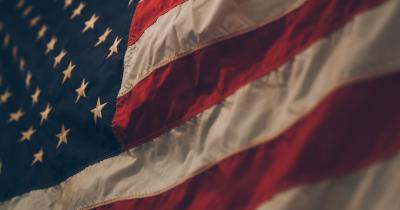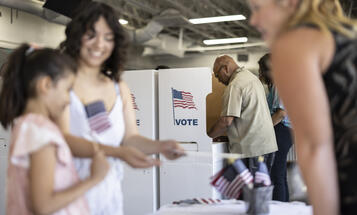
Defending the Voting Rights of Jail Detainees
The denial of voting rights to pretrial jail detainees is one of the most hidden and racially disparate forms of voter disenfranchisement.

As we kick off 2020, civil rights lawyers are focused on protecting voting rights so that everyone can be heard in this pivotal presidential election year. One of the most hidden and racially disparate forms of voter disenfranchisement, however, is receiving too little attention: the denial of voting rights to pretrial jail detainees.
On any given day—including Election Day—over half a million people who are innocent until proven guilty sit in jail awaiting trial.
On any given day—including Election Day—over half a million people who are innocent until proven guilty sit in jail awaiting trial. Many of them are there because they are too poor to afford their bail. Although they are eligible and often registered to vote, citizens detained pretrial cannot get to the polls and often have no way of voting by absentee ballot. In the 1974 case O’Brien v. Skinner, the Supreme Court recognized that pretrial detainees have a fundamental right to vote and cannot be absolutely denied the franchise. And yet violation of their rights remains a systemic problem across the nation.
Demos is working to change this by filing litigation and advocating with election officials in several states.
My organization, Demos, is working to change this by filing litigation and advocating with election officials in several states. For example, we are currently suing Ohio in Mays v. LaRose, 2:18cv1376 (S.D. Ohio), over the state’s practice of denying absentee ballots and any other means of voting to eligible voters who are jailed in the days leading up to an election.
Eligible Ohio voters who find themselves jailed on pending charges or on a misdemeanor conviction may request an absentee ballot from their county board of elections. But such a request must be made in person at the board’s office by close of business on the Friday before an election or, if sent my mail, must be received at the board’s office by noon on the Saturday before an election. This means that no person arrested after close of business Friday and held in custody through Election Day will be able to request and vote by absentee ballot. Since county officials don’t make voting available on-site in jails and don’t escort people to the polls, these “late-jailed” voters have their voting rights absolutely denied.
As it happens, Ohio does allow people who are unexpectedly hospitalized (or whose minor children are unexpectedly hospitalized) in the days before an election to make an emergency absentee ballot request—all the way up to 3:00 p.m. on Election Day. The county will send two election officials to the hospital, ballot in hand, and these election officials will then deliver the completed ballot back to the board of elections. Alternatively, hospitalized voters can have a family member pick up the ballot and return it for them. This courtesy is not extended to late-jailed voters, even though the state plays a pivotal role in their inability to get to the polls. Unlike with hospitalized voters, it is the state that is keeping the accused from the polls.
In November 2018, our team at Demos, along with co-counsel at the Campaign Legal Center and the MacArthur Justice Center, sued in federal court. The Monday before the midterm elections, we sat in arraignments in multiple counties and observed which individuals were ordered detained. Collaborating with public defenders and other in-state advocates, and cross-referencing names from court dockets with the voter registration database, we then visited impacted individuals in jail. Two men detained in the Montgomery County Jail in Dayton, Quinton Nelson Sr. and Tommy Mays II, asked that we represent them and agreed to be class representatives in a class action suit.
Both were registered voters living in Dayton who had intended to vote on Election Day, November 6, 2018. Mr. Nelson was arrested at 10:00 p.m. on the Friday before Election Day, and Mr. Mays was arrested at 7:00 p.m. that Saturday. Both were detained on misdemeanor charges at the county jail on $10,000 bail and could not afford to buy their release. They completed handwritten affidavits in the jail’s visitation room on Monday evening.
As voting got underway the next morning, our team made its way from Dayton to the federal courthouse in Columbus. Having finished our pleadings during the drive, our team walked into federal court with a complaint and TRO motion alleging violations of the Equal Protection Clause and First Amendment. The judge held a hearing, granted the TRO, and ordered that ballots be delivered to our clients at the Dayton jail. Mr. Mays and Mr. Nelson both voted that day. And constitutional claims that otherwise would have faced serious ripeness and mootness problems were now properly before the court.
In the year that followed, we conducted extensive discovery and established a firm record that Ohio denies the opportunity to vote to citizens detained in the days leading up to an election. One election official also stated in deposition testimony that there are fifteen times as many hospitalized voters as jailed voters in the state, and the hospital voting process takes eleven times longer to complete than the jail voting process. When asked if there was “anything about the jails as opposed to the hospitals, that would make it such that there would be a reason the board would not be able to, on election day, after 3 p.m., receive the applications, determine the eligibility and print the ballot to deliver to the jail,” the election official answered, “Not to my knowledge.”
In November 2019, U.S. District Judge Michael Watson certified our class and granted summary judgment in our favor. Concluding that late-jailed and late-hospitalized voters are similarly situated in all relevant respects, he noted that the state had not proffered any justification for treating them differently “except the Ohio legislature’s potential determination that [the latter are] ‘particularly worthy’” (citing the state’s brief). Judge Watson continued: “But hospitalized persons are not more worthy of additional voting privileges under our Constitution than jail-confined persons, and offering greater access to the ballot simply because the legislature values the former’s votes over the latter’s is exactly what the Equal Protection clause forbids.”
The court enjoined Ohio from imposing different absentee ballot request deadlines on late-jailed voters and late-hospitalized voters. The state has appealed. Case No. 19-4112. Although the Sixth Circuit denied a stay, it ordered expedited briefing in January and February so that the case can be decided in advance of Ohio’s March 17, 2020 primary.
[R]oughly 1,000 eligible and registered Ohio voters found themselves behind bars and unable to cast a ballot in each of the last four federal general elections.
Voting rights for pretrial detainees is no trivial matter. Our expert witness in Mays estimated that roughly 1,000 eligible and registered Ohio voters found themselves behind bars and unable to cast a ballot in each of the last four federal general elections. And that’s just one state. Jail voting is such a pervasively neglected right that the aggregate consequences of noncompliance with the Constitution must be severe. Moreover, biases and disparities in criminal law enforcement mean that these violations hit communities of color and low-income voters hardest.
More litigation is needed. We are actively building cases and are eager to work with local counsel around the country. Where state and local officials are willing, litigation may be unnecessary and solutions are at hand. One model is the landmark legislation enacted in Illinois last year, SB 2090, which requires that Cook County Jail become a temporary polling place at election time and that all other counties make arrangement for absentee ballot voting. Grassroots groups like Chicago Votes were at the center of the legislative push and are working with government officials to make the reforms a success. Demos is committed to this work and welcomes the partnership of anyone interested in building a more inclusive democracy.
This piece originally appeared in the Winter 2020 edition of the Federal Bar Association Civil Rights Law Section's Civil Rights Insider.



